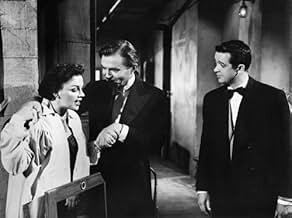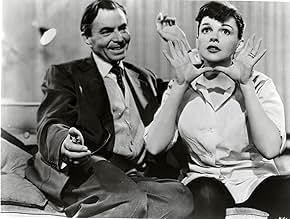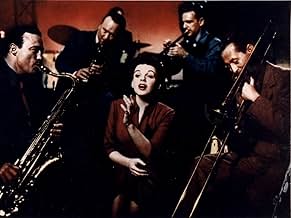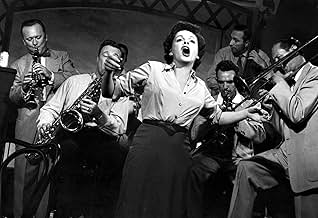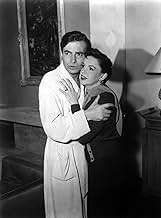IMDb RATING
7.5/10
21K
YOUR RATING
A fading matinee idol helps a young singer and actress find fame, even as age and alcoholism send his own career on a downward spiral.A fading matinee idol helps a young singer and actress find fame, even as age and alcoholism send his own career on a downward spiral.A fading matinee idol helps a young singer and actress find fame, even as age and alcoholism send his own career on a downward spiral.
- Nominated for 6 Oscars
- 7 wins & 14 nominations total
Tommy Noonan
- Danny McGuire
- (as Tom Noonan)
John Alban
- Academy Awards Attendee
- (uncredited)
Laurindo Almeida
- Guitarist
- (uncredited)
Leon Alton
- Usher
- (uncredited)
Rudolph Anders
- Mr. Ettinger
- (uncredited)
David Armstrong
- Soundman
- (uncredited)
Phil Arnold
- Agent #3
- (uncredited)
Nadine Ashdown
- Esther - Age 6
- (uncredited)
Gertrude Astor
- Racetrack Spectator
- (uncredited)
Featured reviews
On a brief getaway this past weekend, the hotel where I was staying had TCM (Turner Classic Movies) on its cable roster and, lo! and behold, there was Judy singing and acting her heart out in letterbox and stereo sound. TCM...you're the best!
It was the restored version, thank the good Lord, with that sad reminder of Warner Brothers' pathetic timidity in trashing Cukor's original cut, but recalling for us his masterful use of the widescreen ratio. (A "formatted" version would be simply unwatchable, what with numerous scenes played by actors perched on the outer reaches of the screen, opposite each other.)
James Mason turns in an absolutely brilliant performance, especially when one recalls the rigors of production, with filming going months over schedule, due to Judy's unhappy vicissitudes (so evident in her appearance even within the same scene!) With the very able support of Charles Bickford, as the most benign studio head ever, and Jack Carson proving why Warners kept him employed so often for so many years.
Plus musical direction taking fabulous advantage of Warners' studio orchestra (and WB's sound technicians who were, for several decades running, the envy of all the other major studios), and arrangements that must have overwhelmed first-run audiences with their incredible richness.
It's a must-see, all right, and is in a class by itself, among the several screen versions of this beloved Hollywood saga.
It was the restored version, thank the good Lord, with that sad reminder of Warner Brothers' pathetic timidity in trashing Cukor's original cut, but recalling for us his masterful use of the widescreen ratio. (A "formatted" version would be simply unwatchable, what with numerous scenes played by actors perched on the outer reaches of the screen, opposite each other.)
James Mason turns in an absolutely brilliant performance, especially when one recalls the rigors of production, with filming going months over schedule, due to Judy's unhappy vicissitudes (so evident in her appearance even within the same scene!) With the very able support of Charles Bickford, as the most benign studio head ever, and Jack Carson proving why Warners kept him employed so often for so many years.
Plus musical direction taking fabulous advantage of Warners' studio orchestra (and WB's sound technicians who were, for several decades running, the envy of all the other major studios), and arrangements that must have overwhelmed first-run audiences with their incredible richness.
It's a must-see, all right, and is in a class by itself, among the several screen versions of this beloved Hollywood saga.
Who would have thought? Cukor, never having worked in colour before AND never having worked in widescreen before did the best piece of work of his career here. 'The Man That Got Away' is always considered one of the best musical numbers to come out of old Hollywood: but wait until you've seen it in widescreen. It's not even the same number, and you get why people who've seen this film in theatres revere the number. Some of the compositions (especially during the opening set piece) aren't just Cukor's best work, they rival anyone's from that era. Let me reitierate: see it in widescreen or trust those of us who have. This musical/ melodrama/tragedy set the bar so high that 50 years later people remember this film but not the musical that got a best picture nomination that year, OR, the performance that won Best Actress that year.
Count me among those who love this film, but am I the only one who feels for Libby, played by Jack Carson? Yes, he's snide and spiteful, but for God's sake, who wouldn't be in his shoes? When he says, "Norman Maine's charm escapes me." I tend to agree with him. What makes this violent drunk so special anyway, except that he's played by James Mason? And, although she's played by Judy Garland at her radiant best, isn't Esther a classic co-dependent wife? Have any of you adoring fans ever actually dealt with a close one who's alcoholic?
When the studio mogul says, after Norman Maine dies, "you didn't know him at all," I feel like arguing the point. Libby should say, "Maybe YOU didn't know him, Oliver. Did he ever insult you for making him do his job? Did he ever punch you out? Did you ever have to continually face his dirty side, as I did, which he--and you too, Oliver--refused to confront?"
Maybe I'm a poop. But I had to say it.
And, yes, it's a brilliant film.
When the studio mogul says, after Norman Maine dies, "you didn't know him at all," I feel like arguing the point. Libby should say, "Maybe YOU didn't know him, Oliver. Did he ever insult you for making him do his job? Did he ever punch you out? Did you ever have to continually face his dirty side, as I did, which he--and you too, Oliver--refused to confront?"
Maybe I'm a poop. But I had to say it.
And, yes, it's a brilliant film.
The 1954 musicalized version of A Star Is Born is a great film. Judy Garland and James Mason (both Oscar nominated) turn in terrific performance as Esther and Norman. Like its 1937 predecessor (which starred Janet Gaynor and Fredric Marchboth Oscar nominated), the 1954 version follows the ups and down of two people set against the vicious world of Hollywood. The newer version sticks to the basic story but adds some great numbers for Garland, including "The Man That Got Away" and "I Was Born in a Trunk." In a major comeback, Garland had not worked in films since Summer Stock (1950), and her performance here is the best of her career. That she lost the Oscar to Grace Kelly for The Country Girl is one of Hollywood's great inequities. Mason lost to Marlon Brando for On the Waterfront. Garland sings superbly and is a great comic and dramatic actress. Her Esther is more vulnerable than Gaynor's just as Mason's Norman is more pathetic than March's. I love both versions. Charles Bickford and Jack Carson play the other major parts, played by Adolphe Menjou and Lionel Stander in 1937. Two major supporting roles from the 1937 version were cut from the 1954 version: Esther's first Hollywood friend (Andy Devine) and her intrepid grandmother (the great May Robson). But Garland's musical numbers make up for their absence. Oddly, despite the great hullabaloo surrounding A Star Is Born, it was not nominated for best picture, and George Cukor was bypassed in the directing category. One of the best musicals ever made.
Much has been written about this movie (to extremely great length) in other reviews, so I'll try to keep this fairly brief and concise.
First, the restored version runs at 176 minutes. The movie originally ran at 181 minutes, but was cut to 154 minutes when theater owners complained that they were losing money due to the excessive length. The cut destroyed the integrity of the movie - director Cukor never saw the movie again. However, the restored version contains stills to replace some of the cut footage, and gives a better sense of the film's power and scope.
Second, all four major studio versions of the story (including "What Price Hollywood?") have their own merits and differ greatly from one another. If you like the story, see them all and compare for yourself. It's quite fun to compare!
Third, definitely see this version for Judy. Sure, Judy's "The Man That Got Away" may be the greatest musical moment on cinema, but it's her dramatic performance that will keep your attention over almost three hours. James Mason is on target, and the supporting cast is fine, but Judy just dominates the screen. It's an opportunity to see a true genius in action at the absolute height of her powers. For more dramatic Judy, see her in "The Clock".
George Cukor was acclaimed as the great director of actresses, and he raises Judy to the height she deserves. I love Judy. This is a 10 out of 10.
First, the restored version runs at 176 minutes. The movie originally ran at 181 minutes, but was cut to 154 minutes when theater owners complained that they were losing money due to the excessive length. The cut destroyed the integrity of the movie - director Cukor never saw the movie again. However, the restored version contains stills to replace some of the cut footage, and gives a better sense of the film's power and scope.
Second, all four major studio versions of the story (including "What Price Hollywood?") have their own merits and differ greatly from one another. If you like the story, see them all and compare for yourself. It's quite fun to compare!
Third, definitely see this version for Judy. Sure, Judy's "The Man That Got Away" may be the greatest musical moment on cinema, but it's her dramatic performance that will keep your attention over almost three hours. James Mason is on target, and the supporting cast is fine, but Judy just dominates the screen. It's an opportunity to see a true genius in action at the absolute height of her powers. For more dramatic Judy, see her in "The Clock".
George Cukor was acclaimed as the great director of actresses, and he raises Judy to the height she deserves. I love Judy. This is a 10 out of 10.
Did you know
- TriviaGeorge Cukor offered Marlon Brando the role of Norman Maine on the set of Jules César (1953). "Why would you come to me?" asked Brando. "I'm in the prime of my life... If you're looking around for some actor to play an alcoholic has-been, he's sitting right over there"- pointing at his costar James Mason, who got the part.
- GoofsAfter Vicki comes home and she performs in her house for Norman, the doorbell rings and he goes to the door to accept a package for Vicki. His hair is all mussed-up when he goes to the door, but after he closes it and the camera goes back to him, there isn't a hair out of place. Then he walks over to where Vicki is and his hair is all mussed-up again.
- Quotes
[last lines]
Vicki Lester: Hello, everybody. This is Mrs. Norman Maine.
- Alternate versionsContrary to popular belief, the film was not originally at 181 minutes, but rather 196 (3hrs. and 16mins.) at a post-premiere shown on August 8, 1954 in Huntington Park, California. After its second post-premiere - the very next day - two scenes of 15 minutes total were deleted; making the film run its original world debut length at 181 minutes. One was a number called "When My Sugar Walks Down the Street" that came after Judy's take of "I'll Get By" in the 'Born in the Trunk' sequence, the other was a scene where Garland and James Mason's characters (Vicki and Norman) were picnicking on the beach; production stills and promotional advertisements are the only thing left in existence of the footage. After its world premiere on September 29, 1954, 27 minutes was cut, bringing it down to a mediocre 154 time length. Those scenes were:
- 1) Esther quitting the band
- 2) The Trinidad Coconut Oil Shampoo
- 3) Esther working at a drive-in
- 4) Norman being driven away drunk in his car
- 5) Norman inquiring Esther's old landlady
- 6) Spotting Esther on the TV commercial
- 7) Tracking down Esther at her new boarding residence
- 8) Driving down the strip - Esther getting sick
- 9) "Here's What I'm Here For" musical number - Norman proposes
- 10) "Lose That Long Face" musical number - Vicki breaks down
- ConnectionsFeatured in Film Night: Special: Forty Years in Hollywood (1970)
- SoundtracksGotta Have Me Go with You
(uncredited)
Music by Harold Arlen
Lyrics by Ira Gershwin
Performed by Judy Garland with Jack Harmon & Don McKay
Details
Box office
- Budget
- $5,019,770 (estimated)
- Gross US & Canada
- $4,335,968
- Gross worldwide
- $4,350,001
- Runtime
- 2h 34m(154 min)
- Aspect ratio
- 2.55 : 1
Contribute to this page
Suggest an edit or add missing content








